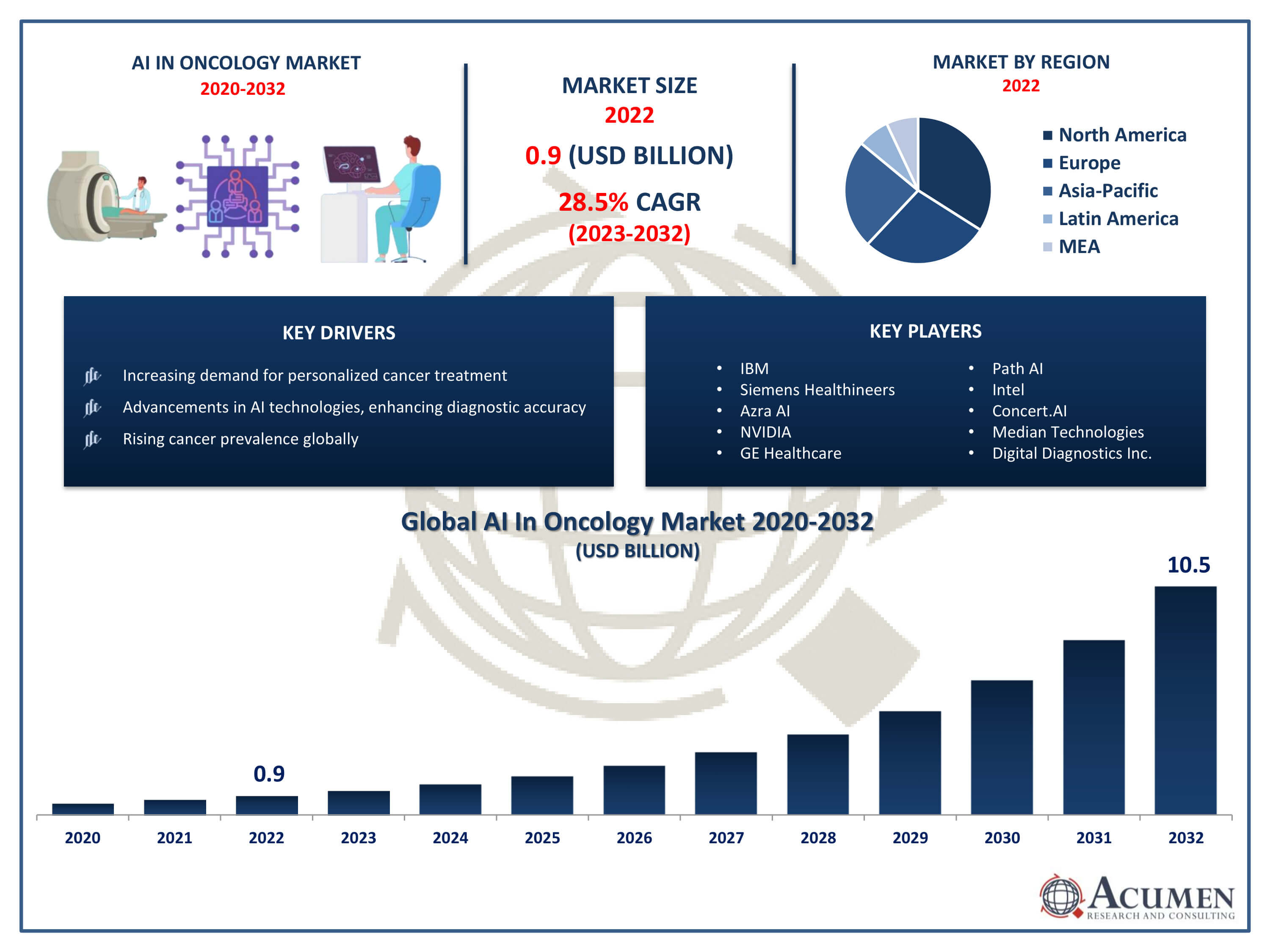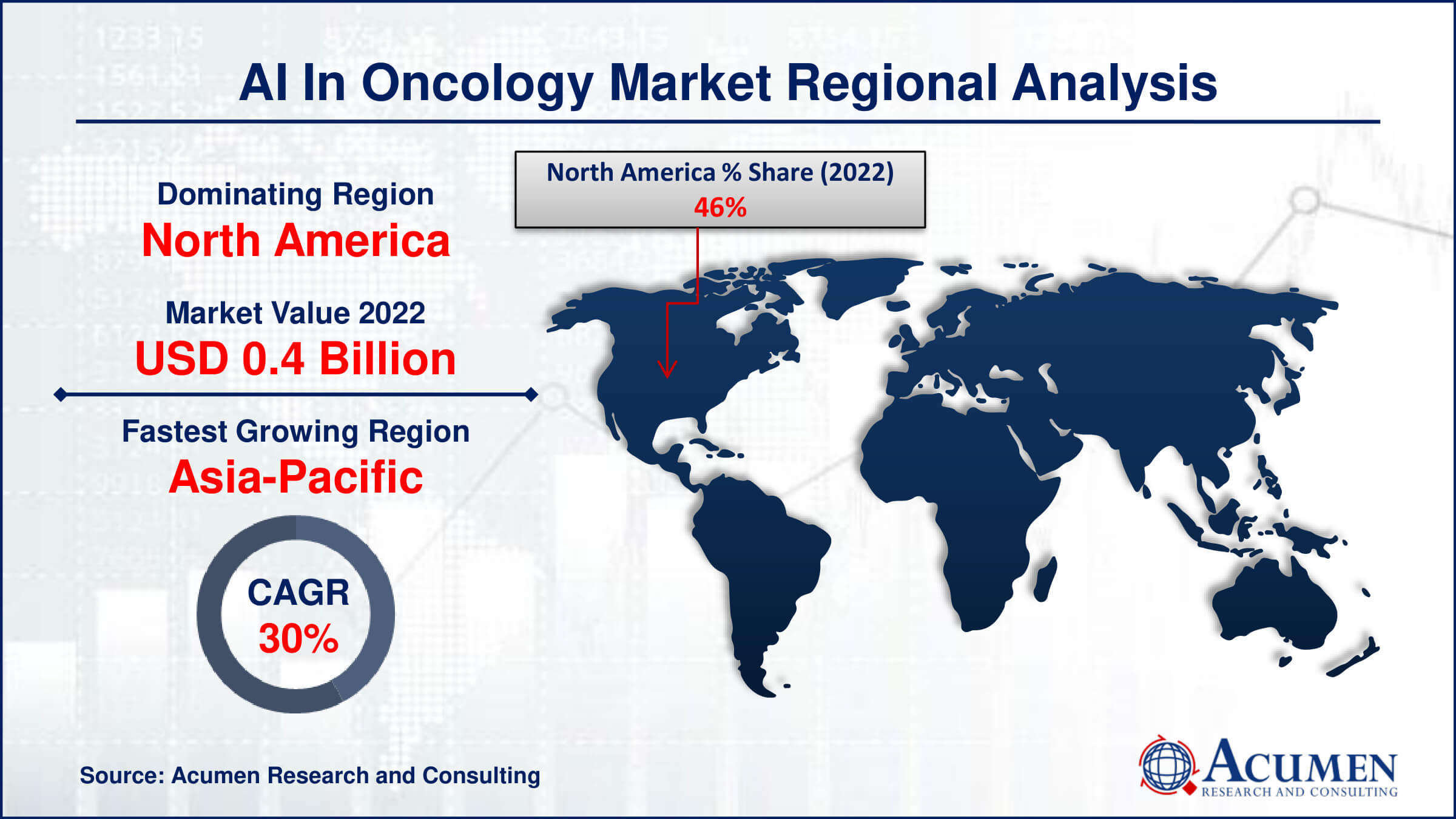December 2022
AI In Oncology Market Size accounted for USD 0.9 Billion in 2022 and is projected to achieve a market size of USD 10.5 Billion by 2032 growing at a CAGR of 28.5% from 2023 to 2032.
The Artificial Intelligence (AI) In Oncology Market Size accounted for USD 0.9 Billion in 2022 and is projected to achieve a market size of USD 10.5 Billion by 2032 growing at a CAGR of 28.5% from 2023 to 2032.
AI in Oncology Market Key Highlights

AI in oncology refers to the application of artificial intelligence (AI) technologies, such as machine learning and deep learning, in the field of cancer diagnosis, treatment planning, and patient care. These technologies have the potential to revolutionize oncology by analyzing vast amounts of medical data, including patient records, imaging scans, genomic data, and pathology reports, to assist healthcare professionals in making more accurate and personalized treatment decisions. AI algorithms can identify patterns and correlations in data that may not be apparent to human clinicians, leading to earlier detection of cancer, more precise diagnosis, and optimization of treatment regimens.
The market for AI in oncology has been experiencing rapid growth in recent years, driven by several factors. The increasing incidence of cancer worldwide, coupled with the growing volume and complexity of medical data generated by advancements in technology, has created a pressing need for more efficient and effective methods of cancer diagnosis and treatment. Additionally, the rising demand for personalized medicine and targeted therapies has further fueled the adoption of AI solutions in oncology, as these technologies enable healthcare providers to tailor treatments to individual patients based on their unique genetic makeup and clinical characteristics.
Global AI in Oncology Market Trends
Market Drivers
Market Restraints
Market Opportunities
AI In Oncology Market Report Coverage
| Market | AI In Oncology Market |
| AI In Oncology Market Size 2022 | USD 0.9 Billion |
| AI In Oncology Market Forecast 2032 |
USD 10.5 Billion |
| AI In Oncology Market CAGR During 2023 - 2032 | 28.5% |
| AI In Oncology Market Analysis Period | 2020 - 2032 |
| AI In Oncology Market Base Year |
2022 |
| AI In Oncology Market Forecast Data | 2023 - 2032 |
| Segments Covered | By Component, By Cancer Type, By Treatment Type, By End-Users, And By Geography |
| Regional Scope | North America, Europe, Asia Pacific, Latin America, and Middle East & Africa |
| Key Companies Profiled | IBM, Siemens Healthineers, Azra AI, NVIDIA, GE Healthcare, Path AI, Intel, Concert.AI, Median Technologies, and Digital Diagnostics Inc. |
| Report Coverage |
Market Trends, Drivers, Restraints, Competitive Analysis, Player Profiling, Covid-19 Analysis, Regulation Analysis |
AI in oncology refers to the utilization of artificial intelligence techniques to enhance various aspects of cancer care. This includes early detection, accurate diagnosis, personalized treatment planning, and outcome prediction. Machine learning algorithms, coupled with vast datasets containing patient information such as medical images, genetic profiles, and treatment histories, enable AI systems to identify patterns and correlations that may not be readily apparent to human clinicians. By leveraging these insights, AI has the potential to revolutionize oncology by improving patient outcomes, optimizing treatment strategies, and ultimately, saving lives. The applications of AI in oncology are diverse and impactful. One key area is early detection, where AI algorithms can analyze medical imaging data such as mammograms, CT scans, and MRIs to identify suspicious lesions or tumors at their earliest stages. AI-powered diagnostic tools can assist radiologists in interpreting complex images, leading to more accurate and timely diagnoses.
The AI in oncology market has been experiencing robust growth driven by several factors. The increasing prevalence of cancer worldwide, coupled with the growing demand for personalized medicine, has fueled the adoption of AI technologies in oncology. These technologies offer the potential to revolutionize cancer care by enabling more accurate diagnostics, precise treatment planning, and outcome prediction. Moreover, advancements in AI algorithms and computational capabilities have enhanced the efficiency and effectiveness of these solutions, further driving market growth. Furthermore, the healthcare industry's recognition of the potential benefits of AI in improving patient outcomes and reducing healthcare costs has led to significant investments in AI-driven oncology solutions. Pharmaceutical companies, healthcare providers, and technology firms are actively collaborating to develop and commercialize innovative AI applications for cancer care.
AI In Oncology Market Segmentation
The global AI in oncology market segmentation is based on component, cancer type, treatment type, end-users, and geography.
AI In Oncology Market By Component
According to the AI in oncology industry analysis, the hardware segment accounted for the largest market share in 2022. This growth is driven by the increasing demand for computational power and specialized hardware infrastructure to support AI algorithms in cancer research and clinical applications. As AI algorithms become more sophisticated and data-intensive, there is a growing need for high-performance computing resources such as GPUs (Graphics Processing Units), TPUs (Tensor Processing Units), and FPGA (Field Programmable Gate Array) accelerators. These hardware solutions are essential for processing large volumes of medical imaging data, genomic data, and clinical records efficiently, enabling faster analysis and more accurate predictions in oncology. Moreover, the development of AI-specific hardware tailored for deep learning tasks has further fueled the growth of the hardware segment in the AI in oncology market.
AI In Oncology Market By Cancer Type
In terms of cancer types, the breast cancer segment is expected to witness significant growth in the coming years. This growth is driven by the pressing need for more accurate and personalized approaches to breast cancer diagnostics, treatment, and management. Breast cancer is one of the most prevalent forms of cancer globally, and early detection plays a crucial role in improving patient outcomes. AI technologies, such as machine learning algorithms and computer-aided detection systems, are increasingly being employed to analyze mammography images, genetic data, and clinical records for early detection of breast cancer lesions and characterization of tumor characteristics. These AI-driven solutions offer the potential to enhance screening accuracy, reduce false positives, and assist clinicians in making more informed decisions regarding patient care. Moreover, AI applications in breast cancer treatment planning and precision medicine are driving the growth of the breast cancer segment.
AI In Oncology Market By Treatment Type
According to the AI in oncology market forecast, the chemotherapy segment is expected to witness significant growth in the coming years. Chemotherapy remains a cornerstone of cancer treatment, but its effectiveness can be limited by factors such as drug resistance and toxicity. AI-driven approaches offer the potential to address these challenges by leveraging patient data, molecular profiling, and treatment response information to tailor chemotherapy regimens to individual patients. By analyzing large datasets and identifying predictive biomarkers, AI algorithms can help oncologists select the most effective chemotherapy drugs and dosages for each patient, optimizing treatment efficacy while minimizing adverse effects. Moreover, AI technologies are being utilized to develop innovative strategies for predicting and mitigating chemotherapy-related side effects, such as nausea, fatigue, and immunosuppression.
AI In Oncology Market By End-Users
Based on the end-users, the research institutes segment is expected to continue its growth trajectory in the coming years. Research institutes play a crucial role in advancing the field of AI in oncology by conducting fundamental research, developing innovative algorithms and technologies, and collaborating with healthcare providers and industry stakeholders. These institutes often have access to extensive datasets, including clinical records, imaging data, and genomic information, which are essential for training and validating AI algorithms for cancer diagnosis, prognosis, and treatment planning. Their expertise in data science, machine learning, and computational biology enables them to develop cutting-edge AI solutions tailored to the unique challenges of oncology. Moreover, research institutes serve as hubs for interdisciplinary collaboration, bringing together experts from diverse fields such as oncology, computer science, bioinformatics, and engineering.
AI In Oncology Market Regional Outlook
North America
Europe
Asia-Pacific
Latin America
The Middle East & Africa

AI In Oncology Market Regional Analysis
North America dominates the AI in oncology market for several reasons, primarily due to its advanced healthcare infrastructure, significant investment in research and development, and the presence of leading technology companies. The region boasts a robust ecosystem comprising healthcare providers, research institutions, and industry stakeholders, facilitating collaboration and innovation in AI-driven oncology. Moreover, North America is home to a large patient population affected by cancer, driving the demand for advanced diagnostic and treatment solutions. The region's strong regulatory framework and favorable reimbursement policies further support the adoption of AI technologies in oncology practice. Furthermore, North America leads in AI development and adoption, with major technology hubs such as Silicon Valley in the United States driving innovation in machine learning, data analytics, and computational biology. This technological expertise, coupled with substantial investment from both public and private sectors, has propelled the development of AI-driven solutions for oncology applications. Additionally, the region benefits from a highly skilled workforce comprising clinicians, researchers, and data scientists who collaborate to develop and deploy AI algorithms for cancer diagnosis, prognosis, and treatment planning.
AI In Oncology Market Player
Some of the top AI in oncology market companies offered in the professional report include IBM, Siemens Healthineers, Azra AI, NVIDIA, GE Healthcare, Path AI, Intel, Concert.AI, Median Technologies, and Digital Diagnostics Inc.
Looking for discounts, bulk pricing, or custom solutions? Contact us today at sales@acumenresearchandconsulting.com
December 2022
September 2022
October 2024
May 2021